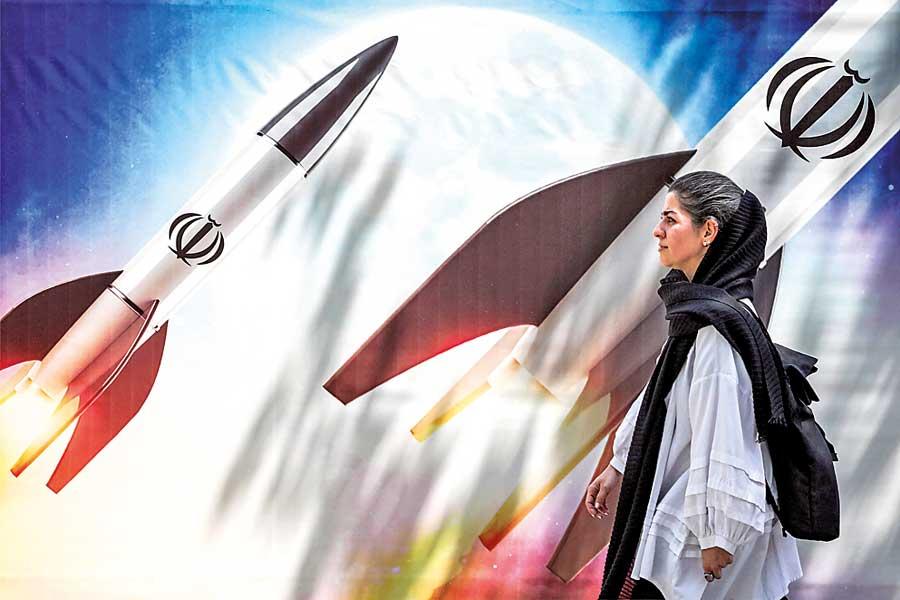19 Apr 2024 - {{hitsCtrl.values.hits}}

A woman walks past a banner depicting launching missiles bearing the emblem of the Islamic Republic of Iran in central Tehran. AFP
Israel’s hardline and war-thirsty Prime Minister Benjamin Netanyahu is more than ever before well close to dragging the United States into a war with Iran. Ever since Iran launched its nuclear programme in the late 1980s, Israel has been jittery. It fears an Iranian nuke will undermine its nuclear monopoly in the region.
nuclear programme in the late 1980s, Israel has been jittery. It fears an Iranian nuke will undermine its nuclear monopoly in the region.
Since Netanyahu became Israel’s prime minister for the first time in 1996, his main foreign policy objective has been to get the United States to attack Iran’s nuclear facilities and prevent the Islamic Republic from achieving nuclear power parity vis-à-vis Israel.
However, US Presidents Bill Clinton, George W. Bush, Barack Obama, and Donald Trump have skillfully circumvented Netanyahu’s efforts to trap them into attacking Iran’s nuclear facilities. As Netanyahu kept adding pressure on Washington, these US presidents would say all options, including the military, were on the table. These US presidents had heeded warnings that an attack on Iran’s nuclear facilities would open the gates of hell in the Middle East.
But the present president, Joe Biden, fell into the trap. On April 14, when Iran attacked Israel in response to Israel’s April 1 attack on Iran’s consulate office in Damascus, several US aircraft were airborne to intercept the barrage of oncoming Iranian projectiles.
Iran’s attack, which was in tune with Article 51 of the United Nations Charter, should have been seen as an equaliser, and the dispute should have been put to rest in the greater interest of world peace. After all, Iran’s attack with advanced notice came more as a warning to Israel than with the intention to cause havoc. It was a game-changer and a powerful statement that the days of Israel dominating the Middle East or deciding the fate of the region were over.
Yet Netanyahu is using the crisis for his political survival. He is whipping up war hysteria to prop up his failing popularity. Israel’s war cabinet has decided to hit back at Iran at a time and place of Israel’s choosing. In their effort to win the world’s sympathy, Israeli government leaders and diplomats are postulating that Iran’s drones and hypersonic missiles could have killed thousands in Israel if they had not been intercepted. They try to hide the glaring fact that the missiles and bombs with which they unleash their collective punishment on Gaza were more lethal than Iran’s 350-odd projectiles that caused no harm to civilians or civilian infrastructure.
Despite the activation of the Iron Dome, other anti-missile systems, and interception by US, British, and Jordanian aircraft, Iran’s strategic missiles hit the Nevatim airbase from where Israeli jets took off to attack the Iranian consulate in Damascus on April 1, killing an Iranian Revolutionary Guard general among a dozen others. It cost Israel US$1.4 billion to ward off the Iranian attack. So whether Iranian missiles reached their targets or not during Operation True Promise, Israel was the loser.
Iran has warned that any further attacks by Israel will draw a harsher response than what Israel witnessed on April 14.
By triggering a conflict with Iran, Netanyahu is trying to achieve several key objectives, apart from propping up his sagging popularity: He is reversing the strained relations with the Biden administration over his reluctance to listen to Washington’s concerns over the worsening humanitarian crisis in the Gaza Strip. He is expecting the US to get involved in the war and destroy Iran’s nuclear facilities. Netanyahu is also diverting the world’s attention from the Gaza genocide. The death toll—without counting the thousands of bodies buried in the rubble—is now close to 34,000, with about 50 percent of the casualties being children.
The US and Israel’s genocide-backing allies, such as Britain and Germany, are urging Israel to exercise restraint. To placate Israel, their spoiled brat and war criminal, these nations are threatening to impose fresh sanctions on Iran, ignoring the fact that it was Israel which provoked Iran.
But Netanyahu keeps even Israel’s allies guessing what he will do. An Israeli attack on Iran’s military or nuclear facilities will signal the beginning of a wider regional conflict. Iran is backed by Hezbollah militias in Lebanon, the Houthis in Yemen, and several militia groups in Iraq. Iran can count on Syria and Russia as well.
On Wednesday, days after Iran carried out its retaliatory attacks on Israel, Hezbollah launched a daring drone attack on an Israeli military facility, inflicting casualties among Israeli soldiers. An all-out Israel-Iran war will result in disruptions to commercial vessel navigation in the Red Sea and the Strait of Hormuz. A day before Iran attacked Israel, Iranian naval forces seized an Israeli-linked vessel in the Strait of Hormuz.
The Houthis, who are the de facto rulers of Yemen, will intensify their military activities in the Red Sea and may even target US military facilities spread across the region.
Also joining the war will be the pro-Iranian Iraqi militia, Kata’ib Hezbollah, which counts substantial support among Iraq’s Shiite Muslim majority.
An all-out war could see the involvement of Arab countries. Iran’s April 14 military response exposed some Arab nations’ pro-Israeli stance. Jordan, in particular, shot down a few Iranian projectiles flying over its airspace.
Although Jordan justified its action by saying it needed to protect its airspace from hostile objects, social media users across the Arab and Islamic world see the Jordanian action as treachery. Their posts recalled how the present King Abdullah’s great-grandfather, Sherif Hussein, the Emir of Mecca, schemed with the British to betray and topple the Ottoman caliphate. As a reward for this treachery, the British made one of Hussein’s sons, Abdullah, the first king of Jordan, a new state Britain and France created in keeping with the 1916 Sykes-Picot agreement.
Jordan’s interception of Iranian drones exposed years-long US efforts to cobble together a military alliance to counter an Iranian threat. Israeli media reports claim that Saudi Arabia and the United Arab Emirates shared intelligence with Israel, although they refused permission for US aircraft to fly over their territories to intercept Iranian drones and missiles.
Saudi Arabia and other Arab countries, already struggling to contain public anger at their lack of action to stop Israel’s genocide in Gaza, are calling for calm.
If Iran responds to the next Israeli attack, once again the US, Britain, and other Western powers are sure to rush to defend Israel, just as they did on April 14. Meanwhile, the US and British actions in defending Israel have prompted Ukraine’s President, Volodymyr Zelenskyy, to ask, “If the Western nations could intercept Iranian missiles and defend Israel, a non-Nato member, why can’t they intercept Russian missiles and defend Ukraine?”
A region-wide conflict will, no doubt, shoot up world energy and commodity prices to unprecedented levels, spelling disaster for developing countries like Sri Lanka, which is struggling to come out of economic bankruptcy. A wider war in the Middle East, which accounts for one-third of the global oil supply, will only expedite the world economy’s fall into a major recession. Several European countries are already perilously close to recession, largely due to the effects of the Russia-Ukraine war. To have one more war, especially in the world’s biggest oil-producing region, will only spell catastrophe for the entire world.
24 Nov 2024 9 hours ago
24 Nov 2024 24 Nov 2024
24 Nov 2024 24 Nov 2024
24 Nov 2024 24 Nov 2024